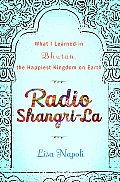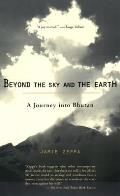
There's a lot of irony in the title of my book,
Radio Shangri-La: What I Learned in Bhutan, the Happiest Kingdom on Earth, which of course doesn't get conveyed if you take it at face value or haven't read it. Bhutan, of course, isn't Shangri-La (whatever that is), nor is it the happiest place on earth. (My boyfriend says that's Costco, but I believe that Disney lays claim to the actual trademark on the phrase.) It's a complicated, dimensional, ever-changing place that happens to offer pristine natural beauty. But it's in no way perfect.
Anyway, because of the title, I invariably get two types of questions: People who want to unlock the mystery of how they can be happier like the Bhutanese...and people who lambaste me for what they assume is an unfairly rosy picture of Bhutan, given the largely unreported story of the Bhutanese refugees who have languished for 20 years in camps along the border of Nepal, unclaimed by either country, and are just now being resettled around the globe.
| 
|

|
A stretch of the Bhutan National Highway somewhere in the Bumthang district. Built and maintained by Indian laborers, many of whom died in the creation of the road when it was first created forty years ago, this highway traverses the entire nation. |
Neither of those questions come from people who have read my book. Radio Shangri-La is partially about another largely unreported dark side of Bhutan — the perilous effects of modernization, globalization, and the media, as well as the fact that (as is the case in many other developing countries) many young people are willing to do whatever they can to get their feet on US soil, for they feel in doing so they will get rich, even if it is at the expense of their family life or cultural values. (The difference with Bhutan is that this phenomenon is relatively new — in part because Bhutan was secluded for so long, and because TV only came in ten years ago, unleashing for Bhutanese the sense of lack that TV and commercialism are designed to create.)

A monk visiting the US for the Smithsonian FolkLife Festival in DC in the summer of 2008, which featured life in Bhutan. One of the favorite past-times of the visiting Bhutanese delegation was shopping.
I didn't focus on the refugee situation in Bhutan, not because I find the situation uninteresting or unimportant or because I wanted to ignore it — it just wasn't the subject most relevant to my experiences there. Nor, was it a subject I was best-equipped to address. I make a point of mentioning it whenever I can, particularly when I speak to groups about it, because intolerance for outsiders is discordant with the Buddhist beliefs that underlie Bhutanese culture. And because the refugee problem in Bhutan is super relevant and evocative of other situations unfolding around the world, as borders erase and people migrate.
 For the record: Some accuse Bhutan of ethnic cleansing by forcing out the Nepalese who were brought in to help build roads and infrastructure as Bhutan was beginning to develop forty years ago, claiming that people who weren't "purely Bhutanese" weren't welcome to stay. The official Bhutanese response is that their system of free health care and schooling couldn't handle the extra citizenry, and that the Nepalese weren't forced out. There's an excellent web documentary about the subject if you want to find out more about it: Bhutanese Refugees: The Story of a Forgotten People. Perhaps you live in a community where the refugees have been resettled; many local papers have been chronicling their integration into their new worlds. I also highly recommend Jamie Zeppa's beautiful book (Beyond the Sky and the Earth: A Journey Into Bhutan) from 1989 about her time as a teacher in Bhutan during the beginnings of the refugee crisis. She addresses it too; she saw it as it happened. Like me, she feels great love for the people there, while being confused at the situation unfolding around her.
For the record: Some accuse Bhutan of ethnic cleansing by forcing out the Nepalese who were brought in to help build roads and infrastructure as Bhutan was beginning to develop forty years ago, claiming that people who weren't "purely Bhutanese" weren't welcome to stay. The official Bhutanese response is that their system of free health care and schooling couldn't handle the extra citizenry, and that the Nepalese weren't forced out. There's an excellent web documentary about the subject if you want to find out more about it: Bhutanese Refugees: The Story of a Forgotten People. Perhaps you live in a community where the refugees have been resettled; many local papers have been chronicling their integration into their new worlds. I also highly recommend Jamie Zeppa's beautiful book (Beyond the Sky and the Earth: A Journey Into Bhutan) from 1989 about her time as a teacher in Bhutan during the beginnings of the refugee crisis. She addresses it too; she saw it as it happened. Like me, she feels great love for the people there, while being confused at the situation unfolding around her.
Like Jamie Zeppa, I fell in love with the people of Bhutan, not the country's policies or politics; and, like her, I was privileged to spend time there (from a completely different perspective, at a completely different moment in time), and was moved to share those stories and observations, and have tried to articulate how the experience of living in a world not my own changed me.